Key takeaways
- Utilitarianism focuses on the consequences of actions, emphasizing the greatest happiness for the greatest number, which challenges individuals to consider the impact of their decisions on others.
- John Stuart Mill’s version highlights the quality of happiness, differentiating between higher (intellectual/emotional) and lower (physical) pleasures while balancing personal liberty with the collective good.
- Practical applications of utilitarianism can be seen in public health decisions and resource allocation, prompting moral dilemmas about fairness and individual choice for the greater good.
- Utilitarianism encourages ongoing reflection on daily choices, fostering a sense of responsibility and connection to the well-being of others, transforming ethics into a personal journey.
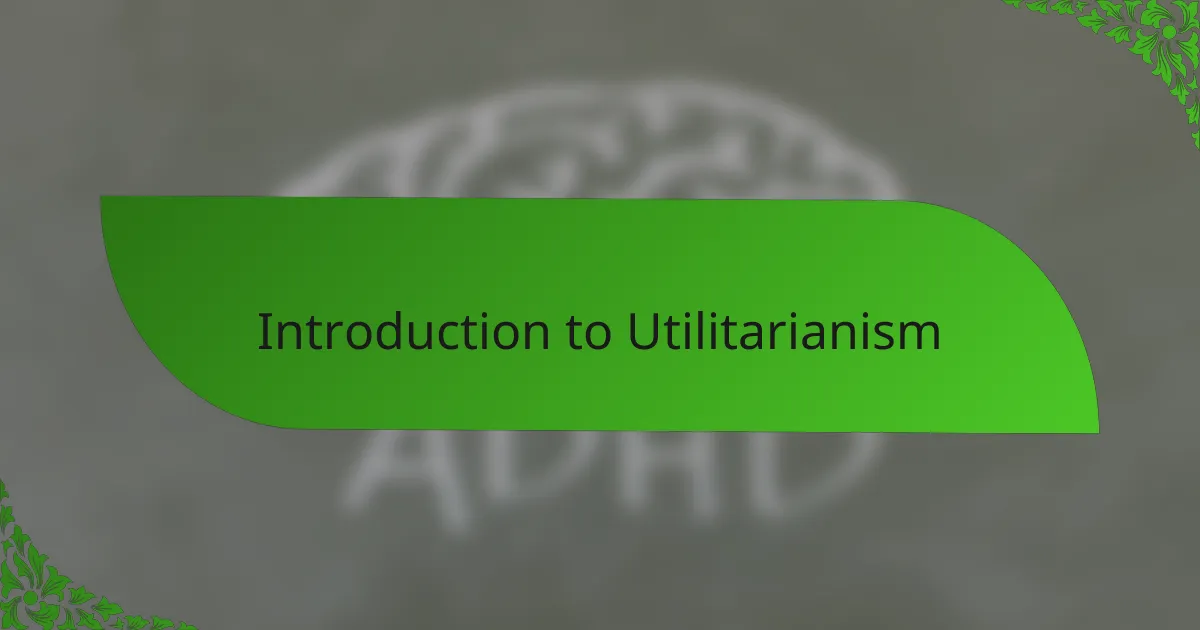
Introduction to Utilitarianism
Utilitarianism is a way of thinking about morality that focuses on the consequences of our actions. I’ve found it fascinating how it asks a simple question: What choice leads to the greatest happiness for the greatest number? This idea feels both straightforward and challenging, especially when faced with real-life decisions.
When I first encountered utilitarianism, I was struck by its practical approach to ethics. It’s not about rigid rules but about weighing outcomes, which sometimes feels like trying to balance on a tightrope. Can happiness really be measured or compared across people? That question has kept me intrigued.
At its core, utilitarianism pushes us to consider how our actions impact others, making morality something active rather than abstract. This perspective can be empowering but also unsettling—how often do we pause to reflect on the ripple effects of what we do? It challenges me personally to think beyond myself in every choice.
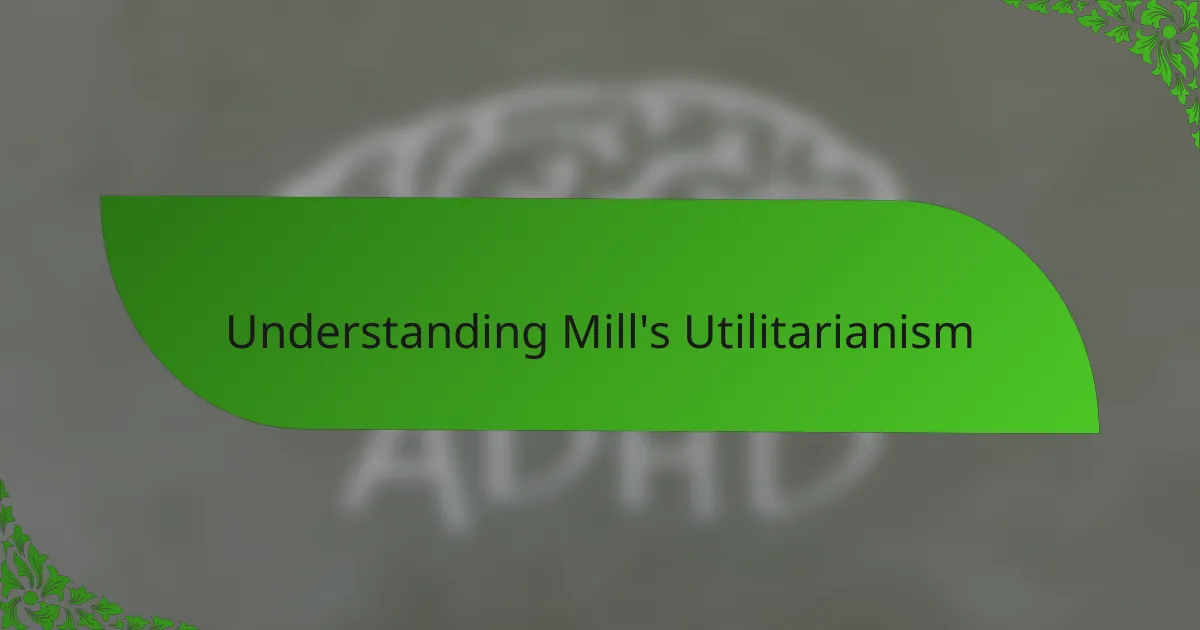
Understanding Mill’s Utilitarianism
Mill’s version of utilitarianism adds an important layer: it’s not just about any happiness, but about the quality of that happiness. I remember first grappling with his idea that some pleasures—like intellectual or emotional ones—are inherently “higher” than mere physical pleasures. It made me reconsider how I value different experiences in my own life.
What fascinates me most about Mill’s thinking is his emphasis on individual liberty within utilitarianism. He argued that freedom matters because it often leads to greater happiness overall. This balance between collective good and personal rights felt both logical and deeply human to me.
Still, I’ve wondered how we can consistently know which pleasures count as higher or lower. Mill suggests that those with more experience in both kinds of pleasure are best placed to judge, but who decides who qualifies as such an expert? This question pulls me back into the ongoing complexity beneath his relatively simple moral formula.
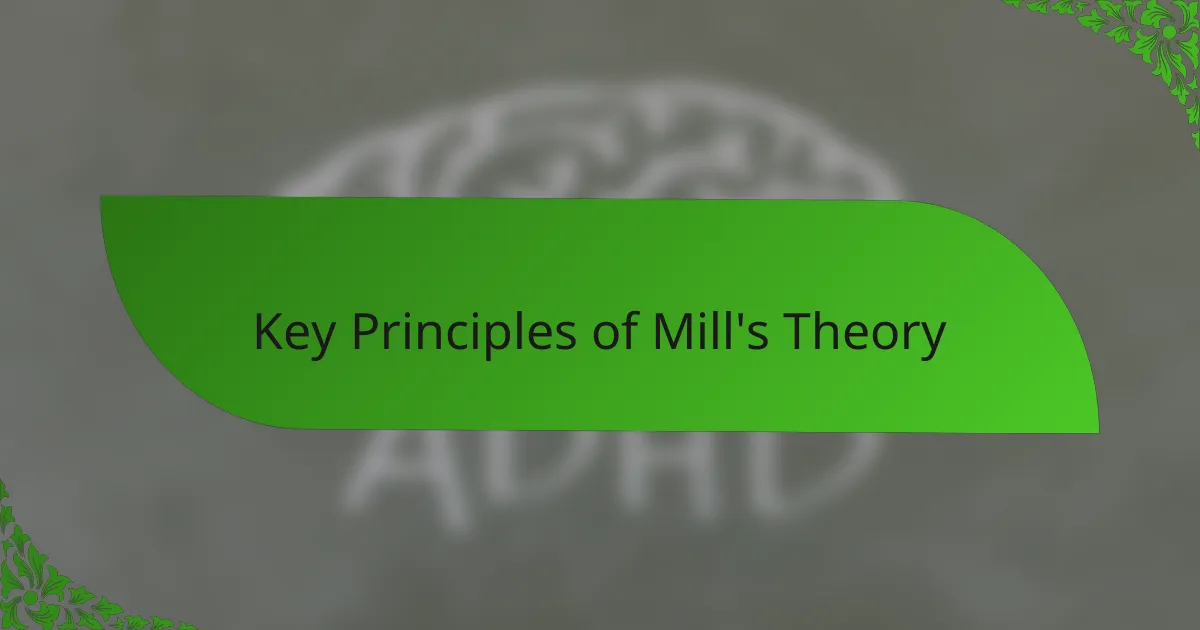
Key Principles of Mill’s Theory
One key principle of Mill’s utilitarianism that really stuck with me is the idea that moral actions should aim to maximize happiness for the greatest number. I find this focus on outcomes both practical and demanding—after all, how often do we pause to ask whether our choices truly increase overall well-being? It’s a question I keep returning to, especially when simple decisions suddenly feel weighted with such significance.
Another aspect I appreciate is Mill’s distinction between higher and lower pleasures. This wasn’t something I immediately accepted; I had to wrestle with what it means to say intellectual joys are “better” than physical ones. Reflecting on this has prompted me to think more deeply about what kinds of satisfaction make life rich and meaningful beyond mere momentary delight.
Mill also stresses the importance of individual liberty as a means to happiness, which to me sounds both sensible and hopeful. Protecting personal freedom doesn’t just feel right morally—it seems essential to fostering the kind of happiness that lasts. His balancing act between collective good and individual rights keeps me thinking: how do we fairly navigate this tension in everyday life?
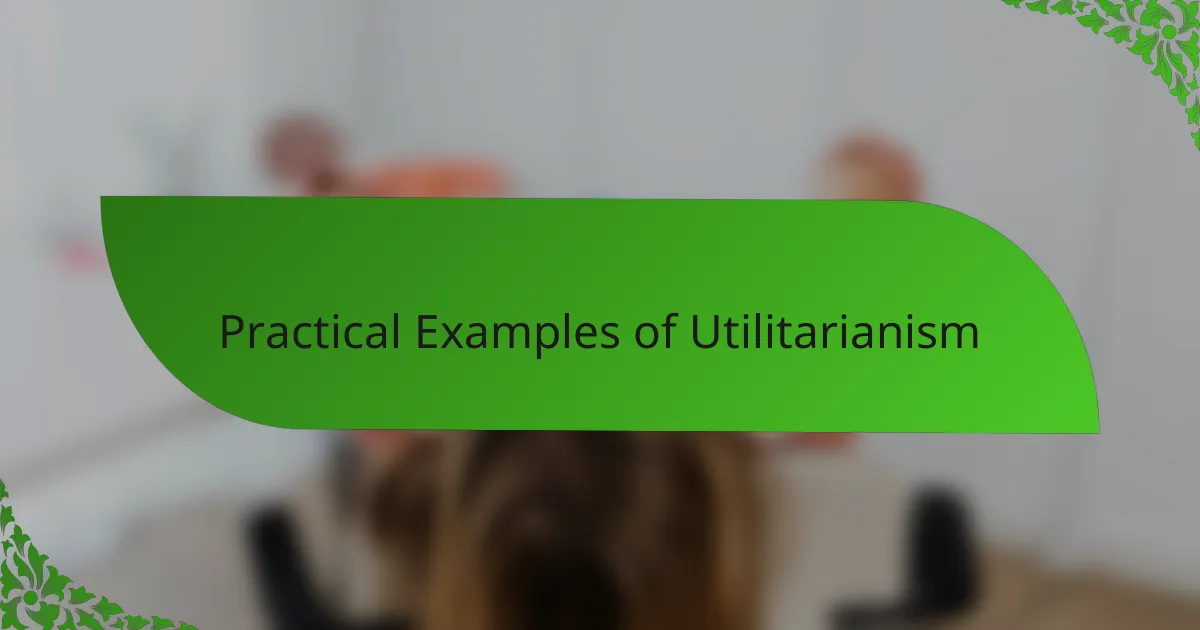
Practical Examples of Utilitarianism
I’ve noticed how utilitarian principles come alive in public health decisions—like when vaccine distribution prioritizes those most at risk to protect the entire community. It’s a clear example where maximizing happiness means preventing suffering on a large scale, but it also raises tough questions about fairness and individual choice. Have you ever wondered how much sacrifice we’re willing to accept for the greater good?
Another instance that struck me involved choosing resources after a natural disaster. When aid organizations decide who receives help first, they often rely on utilitarian logic—focusing on those whose recovery benefits the whole society most. This pragmatic approach feels both compassionate and cold, making me reflect on the emotional weight of such decisions. How does one balance empathy with efficiency in these moments?
Even in everyday life, I see utilitarianism at play when I weigh options like volunteering my time or spending a quiet evening alone. Sometimes, doing what brings the greatest happiness means putting others first, even if it’s less enjoyable personally. This ongoing negotiation between self-interest and the collective well-being keeps me questioning: what truly counts as the “greater good” in our daily choices?

Applying Mill’s Ideas Today
Applying Mill’s ideas today often feels like trying to navigate a moral landscape that’s more complex than ever. I’ve found that his emphasis on quality of happiness pushes me to look beyond surface-level pleasures in modern life—like scrolling through social media—and ask what truly enriches my well-being and that of others. Do the choices I make contribute to lasting fulfillment or just fleeting distraction?
In public policy, Mill’s utilitarianism offers a framework to tackle big questions, like how to balance individual freedoms with community health, especially in times of crisis. I’ve watched debates unfold where maximizing overall happiness clashes with respecting personal liberty, reminding me how his theory remains deeply relevant yet difficult to apply without tough trade-offs. What’s the right balance when protecting many might constrain some?
On a more personal note, I often find Mill’s ideas prompting me to reconsider daily decisions: Should I spend my limited time helping others or pursuing my own passions? His recognition of higher pleasures suggests that sometimes investing in meaningful connections or intellectual growth might serve the greater good better than instant gratification. How often do we pause to reflect on that?
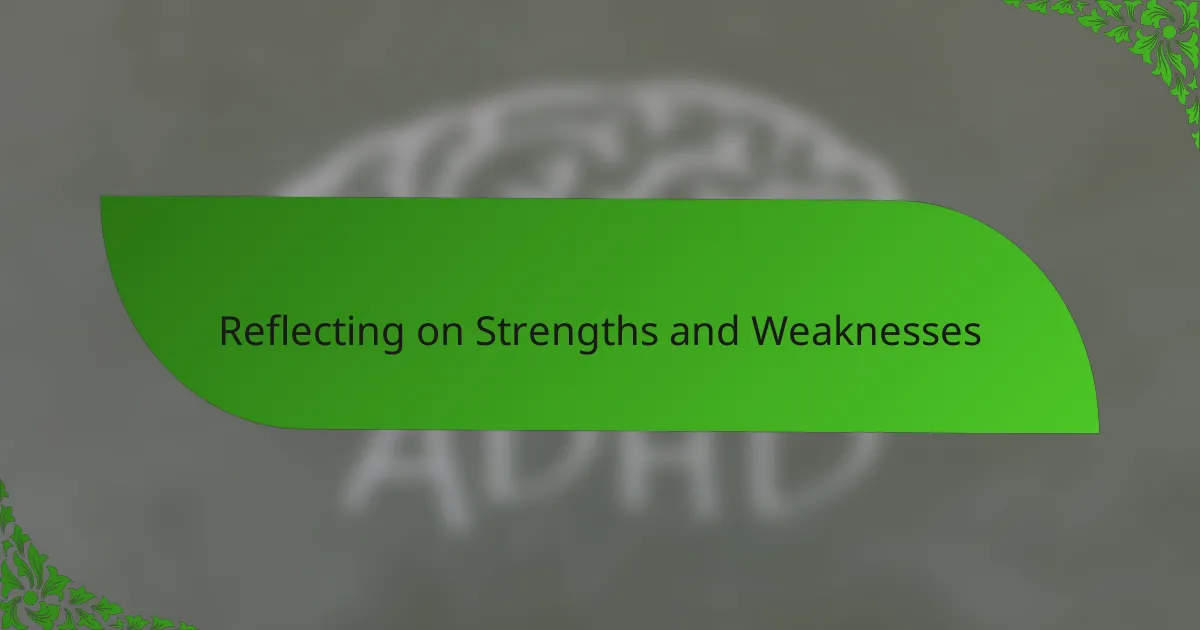
Reflecting on Strengths and Weaknesses
Mill’s utilitarianism impresses me with its clear moral compass—the idea of maximizing happiness feels both inspiring and demanding. Yet, I can’t shake the discomfort around how we actually measure and compare happiness, especially when different people value pleasures so differently. How do you decide whose happiness counts more?
One strength I truly appreciate is Mill’s focus on higher pleasures, which encourages us to look beyond fleeting joys toward deeper fulfillment. I’ve caught myself reflecting on moments when choosing intellectual or emotional satisfaction felt more rewarding than simple pleasures, and that feels like a meaningful guide. But then, who gets to be the judge of higher versus lower pleasures without bias?
At the same time, I worry about the tension between collective happiness and individual rights that Mill tries to balance. While protecting personal liberty seems essential, situations arise where that liberty might conflict with the greater good—leaving me wondering how far utilitarianism can go before it sacrifices too much of personal freedom. Have you felt that tension in your own ethical dilemmas?
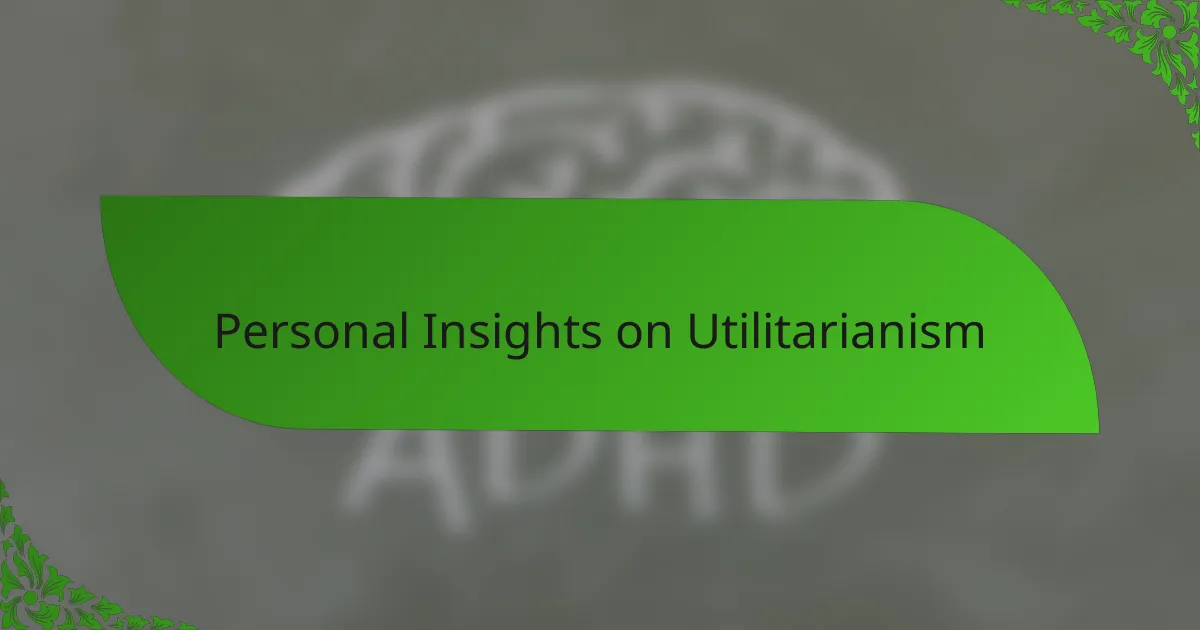
Personal Insights on Utilitarianism
Thinking about utilitarianism has made me realize just how difficult it is to weigh happiness in real life. I’ve found myself caught in moments where trying to maximize overall good feels noble but also emotionally draining—like carrying the weight of everyone’s well-being on my shoulders. Have you ever experienced that kind of moral tension where doing “the right thing” isn’t so clear-cut?
What strikes me most is how utilitarianism encourages constant reflection on our choices. I remember once debating whether to spend a weekend volunteering or simply resting, and I kept turning Mill’s ideas over in my mind—was personal recuperation a “lower” pleasure compared to the “higher” joy of helping others? This dilemma made me appreciate that utilitarianism isn’t just theory; it’s something we live with daily.
Yet, despite its demands, utilitarianism has a way of making me feel connected to a larger purpose. Knowing that my actions ripple into others’ happiness challenges me to act with more care, even when it’s inconvenient. It’s a humbling perspective that, to me, transforms ethics from a set of rules into a personal journey of responsibility.